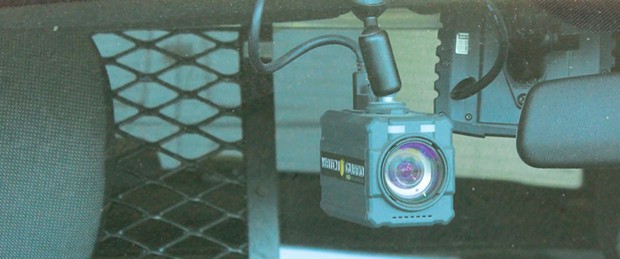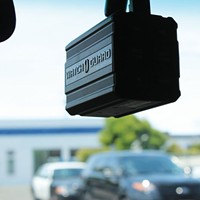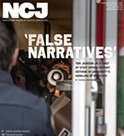Thursday, July 21, 2016
Courts / Government / Media
Arrest Video Can't be Kept Confidential, Appellate Court Rules
Posted By Thadeus Greenson @ThadeusGreenson on Thu, Jul 21, 2016 at 2:58 PM
A Eureka police video depicting the arrest of a 14-year-old suspect can’t be considered a confidential personnel record and must be released to the public, an appellate court has ruled.
The court’s unanimous decision upholds a May 21, 2015 ruling by Humboldt County Superior Court Judge Christopher Wilson, who granted a Journal petition seeking release of the video, finding the public’s interest in seeing the video outweighed any privacy concerns.
The city of Eureka, which objected to the video’s release, along with Humboldt County counsel, appealed Wilson’s ruling, arguing that he erred by not affording the video the protections granted to police officer personnel records. Because the Dec. 6, 2012 arrest led to a citizen complaint and was used as a part of an internal affairs investigation into one of the arresting officer’s conduct, the city argued the video was a part of the officer’s personnel file and should consequently be barred from release.
But in its 12-page ruling authored by Presiding Justice Barbara Jones, the court dismissed that argument, finding the video was not generated as a part of an internal affairs investigation or a record relating specifically to an officer’s advancement, appraisal or discipline.
“The video is simply a visual record of the minor’s arrest,” Jones wrote. “Adopting the city’s broad reading [of the law] would improperly sweep virtually all [police videos] into the protected category of personnel records. … At oral argument, the city claimed dashboard camera videos come within [the class of protected personnel records] because the police department might eventually use the videos to evaluate whether to initiate disciplinary proceedings against a peace officer. We are not persuaded.
“That officers involved in an incident might face an internal affairs investigation or discipline at some unspecified point in the future does not transmute arrest videos into disciplinary documentation or confidential personnel information,” Jones continued.
At oral argument, the Journal’s attorney, Paul Nicholas Boylan, argued that the Legislature intent in shielding police officer personnel records from public view was to protect officers from an unwarranted invasion of personal privacy. But in this case, there was no expectation of privacy, Boylan argued, as the arrest occurred on a public street in plain view.
Reached this afternoon, Boylan said he’s grateful the court issued a published ruling in the case.
“This is a big deal,” Boylan said. “This appellate opinion will now provide guidance up and down the state.”
Boylan said there is a trend throughout the state of agencies extending the statutory protections granted to police officer personnel records — known collectively as Pitchess — to records that don’t warrant them under the letter of the law. “Ultimately, this entire case turned on a simple principle: That Pitchess is designed to protect privacy but this couldn’t be private because it happened out in the open,” Boylan said.
The Davis attorney said he was drawn to the case because he believes “democracy is strengthened by transparency” and he was “offended” by the city’s invoking Pitchess to try to prevent release of the video.
“It was an opportunity to obtain an appellate decision that would prevent this sort of thing from happening again,” said Boylan, who took the case on contingency and will now ask the court to order the city of Eureka to reimburse his fees and costs. “In my experience, prosecutors and city attorneys all through the state improperly use the Pitchess process to keep things secret that were never intended to be covered by Pitchess. It’s what happens. It’s mission creep. It’s a slow process where one kind of law is used to get a result that was never intended.”
The impact of this case, Boylan said, is that it will halt that “mission creep.”
“We were hoping for an appellate opinion that would fix a problem that was growing, and that’s what we got,” he said. “I think this is part of the greater dialogue of whether or not the public has a legitimate interest in accessing, examining and viewing video to determine whether or not police misconduct has occurred. The answer is clearly yes, and this court reinforced that.”
The appellate case was rooted in December 2012 arrest, after which one of the involved officers — former Eureka police Sgt. Adam Laird — was accused of using excessive force, leading to an internal affairs investigation and, ultimately, a criminal accusation that he committed assault under the color of authority and falsified a police report to cover it up. In court documents, Laird countered that he acted appropriately in the face of a violent, non-compliant suspect and that he was being targeted and singled out for prosecution because of his liberal political beliefs and his staunch support of a controversial former chief. The primary piece of evidence in the case was video pulled from the dash camera of a responding patrol car, which captured the entirety of the arrest.
The Humboldt County District Attorney’s Office dismissed the case against Laird before the case went to trial, after multiple use of force experts opined that Laird’s use of force wasn’t excessive. Laird ultimately retired from EPD on July 31, 2014 as a part of a settlement of a claim he brought against the city regarding its handling of his case. He’s now working locally as a private defense investigator.
Eureka City Attorney Cyndy Day-Wilson did not immediately respond to a Journal email seeking comment from this story but we’ll update if we hear from her. The city has 40 days to petition the California Supreme Court to take up the case.
For more background on the case, see past Journal coverage here. And, if reading court documents is your thing, you can find the ruling here, the city’s opening brief here, the Journal’s response here, and the city’s final brief here.
Editor's note: In the interest of full disclosure, it should be noted that this reporter personally filed the petition seeking disclosure of the dash cam video in this case and authored the lower court briefings on behalf of the Journal.
Speaking of...
-

Fourth Fun in Old Town
Jul 9, 2024 -

Eureka Man Killed in SoHum Crash
Jul 1, 2024 -

UPDATE: Pedestrian Killed in Last Week's Crash ID'd
May 28, 2024 - More »
Comments (2)
Showing 1-2 of 2
Readers also liked…
more from the author
-
'Inadvertent Disclosure'
Eureka City Schools emails shed light on Jacobs property swap
- Jul 25, 2024
-
Jackson's Retreat
The contract clause that allowed Cal Poly Humboldt's embattled president to step down into a high-paid instructional position
- Jul 25, 2024
-
'Profound Concern'
Alleged victim distressed by DA's handling of hate speech, antisemitic threats case
- Jul 25, 2024
- More »



































